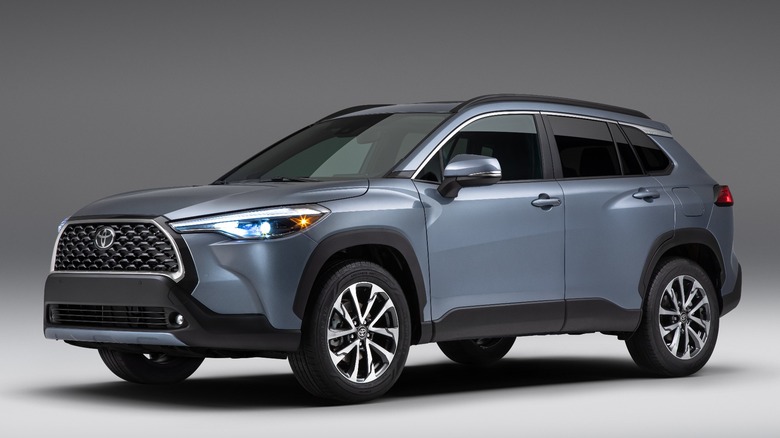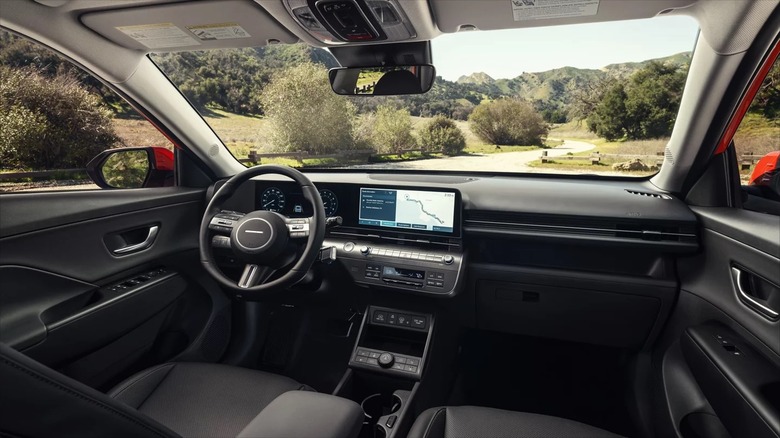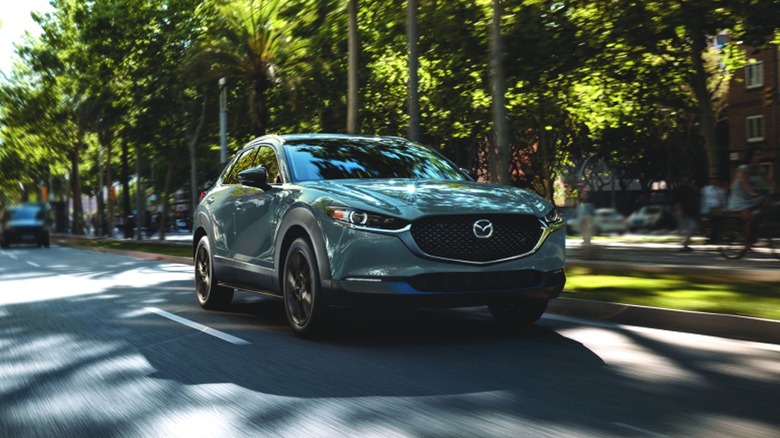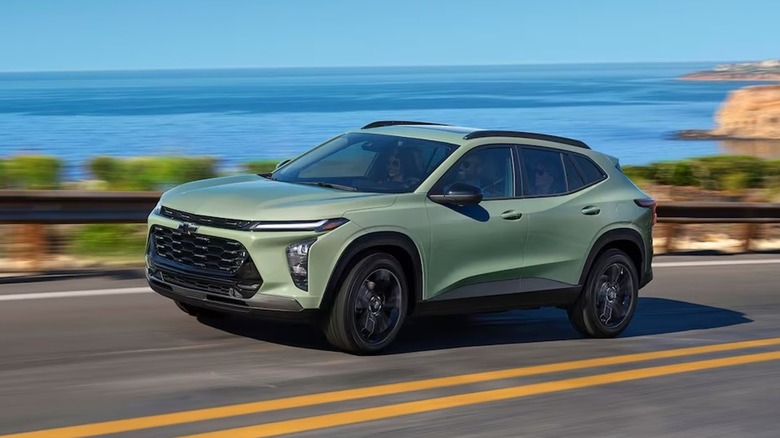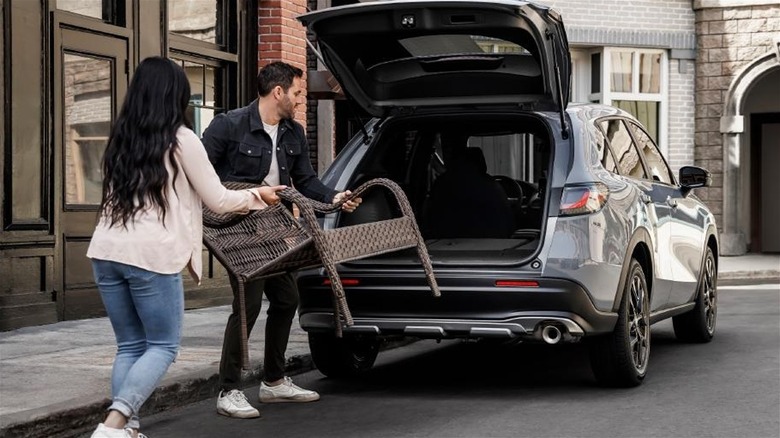Which Other Major Brands' Cars Are Comparable To The Toyota Corolla Cross?
The crossover is a genre of automobile that attempts to bridge the gap between cars and full-size SUVs. Crossovers are more compact, excel in efficiency, and generally provide a nimble driving experience. But these in-between vehicles also afford greater functionality in terms of added cargo space versus sedans, and can tackle challenging conditions with available all-wheel drive options. Essentially, if you can't choose between a sedan or an SUV, a crossover is the best of both worlds. Per Consumer Reports, crossovers have gone from less than 4% of the market in 2000, to almost 40% in 2018. In 2022, the international Crossover market reached $541 billion and is continuing to grow, according to Allied Market Research.
The Toyota Corolla Cross (as the name suggests) is derived from the Corolla sedan/hatchback vehicle, but with an elevated driving position, more interior space (compared to sedans), and all-wheel drive options. First introduced in 2022, this crossover has garnered praise for its economical design, comfort and the generous amount of driver assist technology included on all models. However, some reviews have pointed out that the Corolla Cross lacks in terms of fun, with uninspired acceleration and little in the way of personality. We had a chance to test and review the 2024 Toyota Corolla Cross Hybrid, but found it's stiffest competition might be from within Toyota themselves. Fortunately, there are several other similar crossovers by competing automakers ready to capture your attention, such as the Hyundai Kona, Mazda CX-30, Chevrolet Trax, and Honda HR-V.
Hyundai Kona is close in MSRP and safety tech, with a more exciting interior
The Hyundai Kona is comparable to the Corolla Cross as both are nearly the same price, with the Kona being $390 more expensive. When contrasting Toyota Safety Sense and Hyundai Smart Sense driver assistance features available in the Corolla Cross and Kona, they are nearly neck-and-neck. Among the eighteen safety features listed for both vehicles, the only difference is the Kona features a Rear-Cross-Traffic Alert standard, and the Corolla Cross comes equipped with knee airbags that are absent in the Hyundai.
The Kona sets itself apart from Toyota's crossover with an interior that showcases a minimalist style mixed with advanced technology (something we praised in our 2024 Hyundai Kona review). The Corolla Cross cabin is nearly identical to the Corolla sedan, and does little to elevate or differentiate itself. The Kona provides two 12.3-inch media displays, which are far more eye-catching than Toyota's smaller 8-inch media screen. Hyundai also includes more USB inputs, and a more forward-looking design overall.
Mazda CX-30 has similar space and efficiency, but more power
The CX-30 shares several similarities to the Corolla Cross. Both vehicles can comfortably accommodate up to five people, and offer significant cargo space within less than 4 cubic feet of each other. Both crossovers are also close in terms of fuel economy with the CX-30 offering an EPA combined figure of 29 MPG, versus the Corolla Cross at a slightly better 32 MPG.
When looking at performance, Mazda overtakes Toyota with a larger more potent engine that enhances the experience behind the wheel. The base MX-30 comes equipped with a 2.5L four-cylinder engine that produces 191 horsepower and 186-pound feet of torque. Conversely, the Corolla Cross features a smaller 2.0L four-cylinder capable of 169 horsepower and 151-pound feet of torque. For those who want a bit more gusto under the hood, Mazda also offers a more potent turbocharged 2.5L engine that achieved a 0-60 mph time of under six seconds. We got behind the wheel of the 2024 Mazda CX-30 turbo and had some serious fun with this sporty crossover.
Chevrolet Trax has nearly equal infotainment options, but is less expensive
The Chevrolet Trax and Toyota Corolla Cross are remarkably close in terms of infotainment offerings. The Trax display is also 8-inches diagonal and other elements such as Bluetooth hands-free, WiFi, and USB inputs are equal. The Trax includes the innovative Teen Driver system, which helps parents reinforce safer driving habits as an added bonus.
The 2024 Chevrolet Trax holds the advantage of being the cheapest option at an MSRP of $21,495, an almost $2,400 difference from the Corolla Cross at $23,860. With a lower price point you might expect the Chevrolet to be lacking in features when compared to the Corolla Cross, but this isn't the case. With comparable infotainment, and safety technology, it's evident the Trax is trying to undercut the competition. It's also worth noting that Chevrolet's crossover is a bit roomier in terms of cargo space, but comes equipped with a smaller engine, that while turbocharged, doesn't produce the same output as the Toyota.
Honda HR-V: comparable power trains, but with a superior warranty
The HR-V features the same engine that the Civic sedan and hatchback offer, which proves to be a bit underpowered when compared to other options. However, in terms of powertrain the Honda is close to the Corolla Cross. Both crossovers include a 2.0L engine, continuously variable transmissions (CVT), and aren't too far apart regarding horsepower and torque. Our 2023 Honda HR-V review found that the ride was great, but transmission noise hampered the experience a bit.
The HR-V does offer a better warranty when compared to the Corolla Cross. The roadside warranty length of three years for the Honda is an additional twelve months beyond Toyota's. A roadside warranty is essentially the automaker providing assistance in the case of a vehicle lockout, empty fuel tank, or flat tire on the side of the road. Roadside coverage offers peace-of-mind knowing that you or your family won't be stranded in need of assistance. In addition, the roadside warranty miles for the HR-V span 36,000 miles versus only 25,000 for Corolla Cross.
